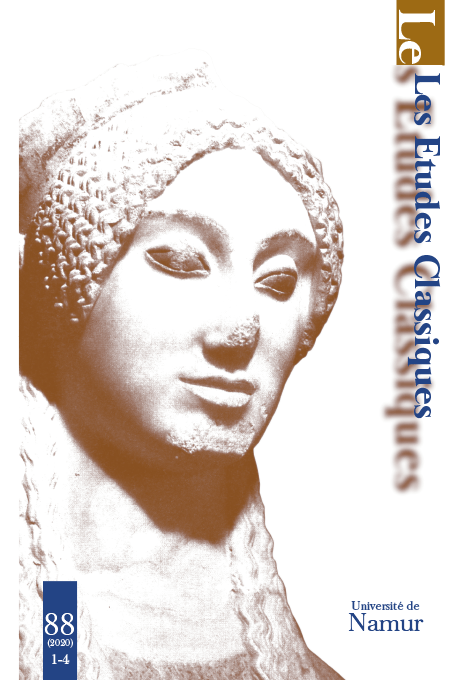 previous article in this issue previous article in this issue | next article in this issue  |

Preview first page |
Document Details : Title: Philologie, stylistique et strates textuelles dans Zosime, IV, 35, 6 - 36, 5 Subtitle: Encore Gratien, la toge pontificale et sa mort sur le pont Author(s): NARDELLI, Jean-Fabrice Journal: Les Études Classiques Volume: 92 Issue: 1-4 Date: 2024 Pages: 283-329 DOI: 10.2143/LEC.92.1.3293859 Abstract : On a longtemps récusé que le trait d’esprit chez Zosime fustigeant le refus de Gratien de porter l’habit pontifical reposât sur un jeu de mots translinguistique qui remonterait à l’informateur supposé latin de sa source Eunape. Il est vrai que le sous-texte latin derrière ce jeu de mots grec a été maladroitement reconstitué par F. Paschoud. Nous le changeons ici en in ponte facere, «agir [c.-à-d. sacrifier] sur un pont», en soumettant l’ensemble de sa lecture historique à l’épreuve de la critique répétée qu’en fit Alan Cameron, puis en l’affinant sur des bases historiographiques et philologiques. Il s’avère que ni Eunape ni Zosime ne sont susceptibles d’avoir conçu le verbatim du jeu de mots, ni même la portée idéologique des calomnies lancées contre Gratien au sujet de son pontificat. La théorie de F. Paschoud, qui postule une source historique latine de haut vol, imprégnée de paganisme, et datant de la fin du quatrième siècle, ex hypothesi les Annales de Nicomaque Flavien Senior, est ainsi remise en selle. It has long been denied that the zinger which lambasts Gratian’s refusal of the pontifical garb in Zosimus hinges on a crosslinguistic pun harking back to a supposedly Latin informer of his source Eunapius. Indeed, the Latin subtext behind this Greek wordplay has been clumsily reconstructed by F. Paschoud. It is modified here into in ponte facere, ‘to perform [i.e. sacrifice] on a bridge’, and its historical interpretation gets assessed through comparison with the protracted critique of it mounted by Alan Cameron, then further refined on historiographical and philological grounds. It turns out that neither Eunapius nor Zosimus are likely to have devised the very wording of the pun, or even the ideological slant seen in the aspersions cast upon Gratian with respect to his pontificate. F. Paschoud’s theory of a high-level, pagan-imbued, Latin historical source from the late 4th century, ex hypothesi the Annals of Nicomachus Flavianus Senior, is thereby reinstated. |
|


